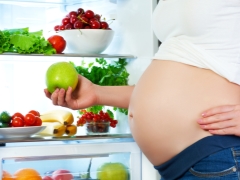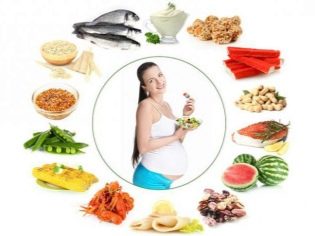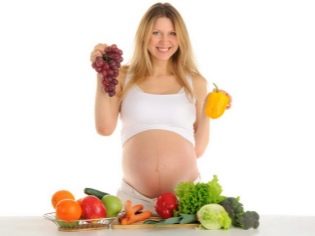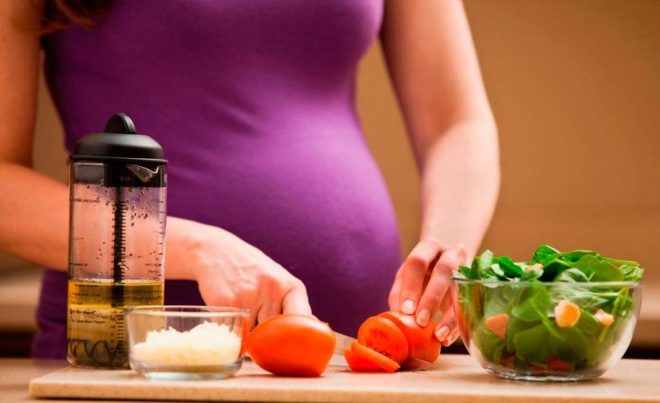Nutrition of a pregnant woman in the third trimester
In order for the baby to fully grow and develop, the expectant mother must eat well and fully. Nutrition in the third trimester of pregnancy is extremely important.
Features of proper nutrition in the 3 trimester
After the end of the 28th week of pregnancy, the third trimester begins. It will last until the onset of labor. This is quite a difficult time both for the body of a pregnant woman, and for her baby.
At this time, the child grows very quickly, is gaining weight well and fills up with already quite a large space inside my mother's tummy. Its internal organs and systems are undergoing final development. All this is a kind of preparation for the birth of a child.
Changes occur in the body of the woman herself. Her hormones are changing, which contributes to the appearance of specific symptoms characteristic of this period of pregnancy. So, many women at this time begin to appear severe swelling. Quite often, future mothers complain of difficulties with regular bowel movements.
In order to minimize negative symptoms, doctors advise you to follow special diets for pregnant women.
Most of the recommendations are made for all women, but there are exceptions: for example, if the expectant mother suffers from some chronic kidney or heart disease, then recommendations for her diet should be made individually.
How to make a diet?
The best way to develop an optimal meal plan is to create an exemplary menu for each day. When compiling it, the future mother should remember that it should contain all the nutrients necessary for her health, which include proteins, fats, carbohydrates, vitamins and trace elements, as well as fiber. If some nutrient in the diet is sorely lacking, then this can lead to malfunctions in the body.
About proteins
Perhaps the most important component of proper nutrition are proteins. In the body, they perform a huge variety of functions. The most important of these during pregnancy is building.
Protein molecules in the process of metabolism are broken down in the body to separate components - amino acids. It is they who are involved in building new cells of the body.
Protein intake during pregnancy varies somewhat. The largest number of them should be ingested by a pregnant woman in the very first weeks of pregnancy, at 8-9 months their consumption is somewhat reduced. This is due to the fact that by this moment the baby has already developed quite well and is formed.
Proteins can be of both plant and animal origin. It is very important that those and other sources of protein are present in the correct food menu of the future mother.
Animal protein is found in poultry, meat, fish, seafood, cheeses and dairy products, as well as in milk. Large reserves of vegetable protein are found in legumes, somewhat less their content in cereals.
The main rule in the use of protein foods - alternation. You can not eat only one kind of protein. For example, consuming only chicken or beef can lead to an inadequate supply of essential amino acids found in other foods.
About fats
Fats are an essential component for the work of the sensory organs, the brain, and also help the expectant mother to maintain beauty during pregnancy. Abuse them in the third trimester of pregnancy should not be. The amount of fat should only compensate for the needs of the body of the future mother and her baby.
Fats can be both beneficial and harmful. Fried foods with lots of butter, as well as fast food will not bring any benefit to the body. Also harmful fat is found in margarine and mayonnaise. These products expectant mothers should not eat.
Good fats are contained in vegetable oils, nuts, oily fish. Proper diet should necessarily include these foods. When adding fats to your menu, the expectant mother should remember that they are very high in calories.
An excellent example of adding fats to the diet of pregnant women at 37-39 weeks of gestation is a vegetable salad made from seasonal vegetables, seasoned with vegetable oil. In summer, you can cook cucumber salad with sweet peppers and parsley, and in the winter - carrot salad.
About carbohydrates
In the third trimester of pregnancy, the expectant mother is already quite actively feeling her baby. A grown-up child exhibits physical activity, may roll in his mother's tummy. To carry out such a stormy activity, the kid needs a lot of energy. It is required by the woman herself, since all her internal organs and systems work at the limit of their capabilities.
To compensate for the increased energy needs, it is necessary to include carbohydrates in the menu. Sucking into the blood, they provide the body with a portion of energy for a certain period of time.
Carbohydrates can be either “fast” or “slow”. The first ones are tasty, the second ones are more useful and functional for the organism.
"Fast" carbohydrates are found in sweets, fruits, some types of vegetables, "slow" - in cereals, cereals. In drawing up the menu is very important to remember the ratio of different types of carbohydrates. On the "slow" view should be given a large part. So, cereal porridge for breakfast or cereal side dish for the main dish is an excellent choice of the correct menu of the future mother.
Healthy foods
In the third trimester of pregnancy it is very important that the expectant mother ate not only healthy food, but also tasty. At 36-38 weeks of pregnancy, anxiety and excitement in a pregnant woman increase. This is due to the fact that the nervous system begins to actively prepare for the upcoming childbirth.
One of the easiest methods to improve mood and create an optimistic mood is eating tasty food. If it is still prepared from healthy products, then it already brings multiple benefits.
Fruits
They are an excellent option for delicacies that the expectant mother can afford. They contain natural sugars that are more beneficial than regular white crystalline sugar. If the expectant mother wants to eat candy or send a spouse to the store for a chocolate cake, then it is better to stop this rush and eat an apple or pear.
Experts advise expectant mothers to choose seasonal fruits. The use of tropical fruits, such as, for example, pineapple or mango, can provoke an allergic reaction in a pregnant woman. During pregnancy, the effects of allergies are more negative, since allergens can affect the baby’s body.
Fruits should not be consumed in large quantities. Eat at one time the whole kilogram of apples or bananas should not be, even if the expectant mother thinks that it is the need of her body or the “whim” of her baby.
Fruits contain quite a lot of fructose, a natural sugar that quickly raises blood glucose levels. Pregnant women who have gestational diabetes should discuss the possibility and amount of eating fruit with their endocrinologist or therapist.
Bird, meat
From the 35th week of pregnancy, it is better to gradually include lower-fat meat products into the diet. Some doctors recommend reducing the amount of meat consumed 2-3 weeks before the birth. It should not be completely abolished, since the birth of a child is accompanied by severe blood loss, accompanied by a decrease in the amount of hemoglobin and serum iron in a woman.
Eat meat products should be about 4 times a week. Low-fat chicken, turkey, and lean veal will do. It is better to refuse fatty pork and mutton at this time. They can worsen the work of the future mother's digestive system and contain a lot of cholesterol deposited on the walls of blood vessels.
The best way to cook meat products is by roasting, stewing or steaming. Also, the meat can be boiled. All fatty layers before cooking meat dishes should be removed.
Many doctors do not advise expectant mothers to eat meat broths. They contain quite a lot of extractive substances that can complicate the work of the liver and gallbladder. It is better to boil meat for soup separately. The broth in the soup is better to make vegetables.
A fish
It is a very important source of protein, and also contains healthy fats. Omega-3 is necessary for the good condition of both the female body and positively affects the nervous tissue of the fetus.
White fish - cod, pollock, halibut, hake will help to diversify the menu. In such breeds of fish contains quite a lot of protein, but a little fat. They saturate the body well, without causing heaviness in the stomach. It is possible to eat fish both with vegetable, and with garnish. An excellent example of a healthy dinner would be an oven-baked fishcake made from cod fillet, with boiled rice and a vegetable salad.
When choosing fish it is very important to remember to be careful. You should choose only fresh and quality products. If the fish is fresh or chilled, then before you buy it carefully inspect the gills. They should be bright red. The eyes of the fish at the same time should be transparent, not cloudy.
Poor quality and stale fish can be a threat to the development of food poisoning. Most toxic infections in pregnant women are quite difficult. A sick woman is hospitalized at the same time. Bacterial toxins in the blood can be a threat to the baby.
Fish should be eaten very carefully for women who have a tendency to allergies. In this case, it is best to first consult with your doctor.
Dairy products
Also are the most important element of the structure of proper nutrition of a pregnant woman. In addition to a fairly high protein content, they include a lot of calcium. This element provides bone density in both the woman’s body and her baby’s.
Sour-milk products contain useful acido-and bifidobacteria. These are useful “agents” involved in maintaining the optimal functioning of the organs of the gastrointestinal tract. Experts believe that regular use of fresh and high-quality sour milk helps to improve the regularity of the chair, as well as normalize the immune system.
Many pregnant women to 3 trimester of pregnancy are quite heavy. Fermented milk products also help to keep it under control. However, you should choose only products that have a small fat content.
Some future mothers make a mistake in the choice of sour milk. They give their preference to low-fat products. It is not right. A small amount of fat is necessary for the female body.
Cheese is an excellent source of protein, and also perfectly saturates the body. When choosing, preference should be given to simple species: cheeses with mold or too fat varieties should be left for the period after the birth of the baby.
A future mother can eat several slices of cheese, for example, with fruits or vegetables, for the benefit of her health. It is not necessary to abuse cheese: this product is quite high in calories.
Vegetables
Without vegetables, the preparation of the diet of the future mother is impossible to imagine. They contain a huge amount of vitamins, trace elements, as well as fiber. Proper combination of vegetables will improve the functioning of the gastrointestinal tract, as well as improve health.
At 32-34 weeks, and in some cases at other times of pregnancy, expectant mothers often complain of the appearance of edema. Puffiness, as a rule, appears on the legs or on the face, below the lower eyelids. Raw vegetables can help reduce edema. Fortunately, if the 3 trimester of pregnancy in this case falls on summer time. In this case, cucumber salad will help to cope with the swelling.
You should eat both raw and cooked vegetables. It is better to have different vegetables in the diet of the expectant mother. The carrot, pumpkin, and zucchini will help to diversify the menu. Add tomatoes to the diet should be careful. Some women may develop a severe allergic reaction to them.
For information on which products are the main ones in the third trimester of pregnancy, see the next video.































